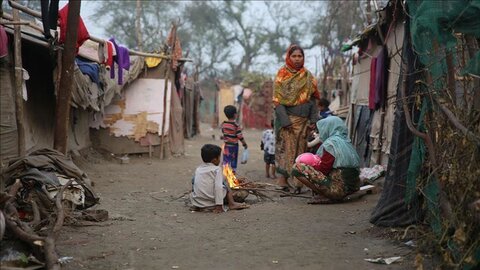Hawzah News Agency - As the world prepares to observe the third anniversary of a brutal military crackdown against Myanmar's Rohingya Muslims, hundreds of them living in Pakistan are still looking for their loved ones who went missing.
Ibrahim Hussein, 56 is one of the Rohingya living in the southern port city of Karachi who still mourns the death of his dozen family members, including infants.
They were killed in a crackdown by Myanmar military on Aug. 25, 2017 – which is called the textbook example of genocide by the UN – forcing around 860,000 people to flee Bangladesh.
Hussein is also missing his young niece and cousin, who went missing since then.
"We have tried our best to locate them. We, during the last three years, have contacted several human rights groups, including the Red Cross to know about them but of no avail, " Hussein, who runs a small grocery in Burma Colony, a middle-income neighborhood of the eastern district of Karachi, Pakistan’s largest city and the commercial capital, told Anadolu Agency.
Conflicting reports about the missing duo have further added to his misery.
"They [family members] were trying to flee together but they soon got separated due to a stampede-like situation. Several got killed, some managed to cross into Bangladesh, while the two went missing," he said.
"Some of our village mates said they [niece and cousin] were also killed along with other family members. Others said they made their way into Bangladesh with some other group," said Hussein, who has made Karachi his home since 1982, when some displaced Rohingya arrived in Pakistan.
Communication blockades
Internet blockade and phone restrictions at Rohingya refugee camps in Bangladesh's southern district of Cox’s Bazar – home to over 1.2 million Rohingya refugees – since September last, has further hampered Hussein's efforts to locate the missing relatives.
"It has been now three years since we have been approaching every available source to look for them. Only Allah knows whether they are alive or dead," he said while trying to hold back his tears.
Mohammad Taha, another Rohingya, who was born and raised in Karachi, has a similar story to share.
At least five of his family members, including two maternal cousins have been missing after the crackdown.
"Our relatives who managed to reach Bangladesh, have also been trying to locate them but still we have no news," he said.
He said it was becoming very difficult to even get in touch with relatives living in Bangladesh due to telephone restrictions.
“We have very limited contact with them. They rarely contact us whenever they get a chance to get out of the camp and call from a public call office," Taha added.
The port city of Karachi is home to more than 400,000 Rohingya Muslims, the highest number after Myanmar and Bangladesh, according to unofficial estimates.
They had started to trickle into the region in the early 1940s – before the creation of Pakistan.
The first exodus took place in 1942 following the first army operation that killed over 100,000 Rohingya Muslims.
A majority of Rohingya refugees, however, made Pakistan their home from 1970-1980 after a long and grueling journey via Bangladesh to India and then Pakistan.
Since then, there have been no mass migrations as India closed its borders with Bangladesh and put restrictions on the travel further to borders with Pakistan.
Former Pakistani President Ayub Khan, who ruled the country from 1958-1969 had allocated land to Rohingya refugees in 1962, paving the way for two settlements – Burma Colony and Arkanabad, which was named after the former Rakhine state – in Karachi’s eastern neighborhoods.

